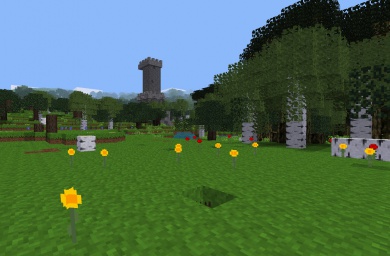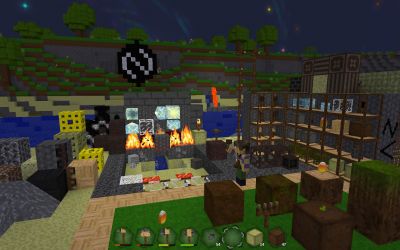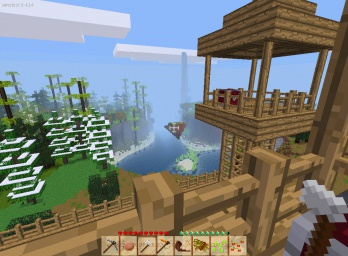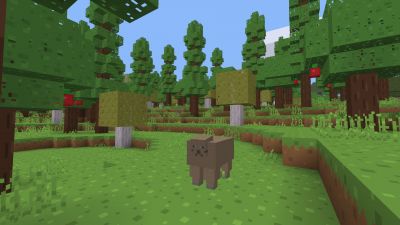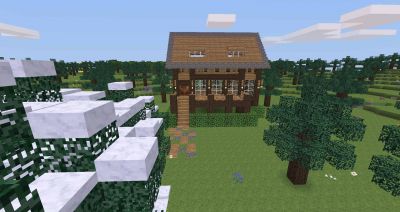Difference between revisions of "Luanti"
(Add section about the name) |
(→Name: Clarify voxel games goal) |
||
| Line 58: | Line 58: | ||
== Name == | == Name == | ||
| − | In the beginning, Luanti was called “'''Minetest-c55'''”. The “c55” stands for “celeron55”, the original creator. The “Minetest” was chosen simply because he wanted to test how far he could come with a Minecraft clone. | + | In the beginning, Luanti was called “'''Minetest-c55'''”. The “c55” stands for “celeron55”, the original creator. The “Minetest” was chosen simply because he wanted to test how far he could come with a Minecraft clone. (But today, Luonti is a game engine for all sorts of voxel games, not just Minecraft clones.) |
As the project attracted a larger following, the ”-c55” was dropped and so the new name was “'''Minetest'''” and that name stuck for many years. But many people didn’t like the name because of the “test” in the name. | As the project attracted a larger following, the ”-c55” was dropped and so the new name was “'''Minetest'''” and that name stuck for many years. But many people didn’t like the name because of the “test” in the name. | ||
Revision as of 18:12, 23 October 2024
| English |
Luanti is a free software game engine to create various games based on voxel gameplay, inspired by InfiniMiner, Minecraft, and the like. Luanti was originally created by Perttu Ahola (alias “celeron55”).
The basic idea of each game is always the same: The player is thrown into a huge world made out of cubes/blocks. Most of the time, these cubes make the landscape and these blocks can be removed and placed almost entirely freely. Using the collected items, new tools and other items can be crafted. Games in Luanti can, however, be much more complex than this.
A core concept of Luanti is a built-in modding capability, based on the Lua programming language. Mods allow one or more certain aspects of an existing game to be modified. Luanti mods can be as simple as adding a few decorational blocks or very complex by (for example) introducing complex new gameplay concepts or generating a completely different kind of world, and many other things. For the player, using a new mod requires to copy or extract some files into a certain location and pressing some buttons in Luanti's interface.
Luanti can be played alone or online together with multiple players.
Games for Luanti can be found on ContentDB.
Features
- A big cube-based world to discover (61840 nodes (cubes) in every dimension)
- Procedurally generated world
- Several world generators with many adjustable parameters
- Extremely high configurability with an advanced settings editor and built-in descriptions, or by using a configuration file
- Customize the graphics and sounds through texture packs
- Download games, mods and texture packs from the built-in ContentDB
- Singleplayer mode and online multiplayer mode
- Server list
- Sophisticated modding system using Lua
- Mods are entirely server-sided. You can join any Luanti server with any mods and start playing, no additional software required
- Relatively low system requirements
Screenshots
Games
As Luanti is an engine, the actual in-game appearance heavily depends on the actual game being played. This is a selection of some of the games that are available for Luanti. A full list of games can be found on ContentDB
Mods
There exists several hundred of mods, most for Minetest Game and some for other games. The largest list of mods can be found on ContentDB
More screenshots
In the Luanti forums, many screenshots are posted by players in several threads:
- High-quality screenshots
- Castles, strongholds, towers and similar structures
- Various buildings
- Any screenshots
System requirements
Hardware requirements
Luanti can be played on low-performance computers and mobile devices (Android). It's played with mouse and keyboard on PC and Mac.
Depending on the game you choose, and the mods it uses, the minimum configuration may not be sufficient.
Operating system
Luanti is cross-platform, for officially supported operating systems see download page)
Legal
Luanti is free software, without advertisements and free of charge. It is licensed under the GNU Lesser General Public License, version 2.1, with artwork generally covered by Creative Commons Attribution ShareAlike 3.0.
Name
In the beginning, Luanti was called “Minetest-c55”. The “c55” stands for “celeron55”, the original creator. The “Minetest” was chosen simply because he wanted to test how far he could come with a Minecraft clone. (But today, Luonti is a game engine for all sorts of voxel games, not just Minecraft clones.)
As the project attracted a larger following, the ”-c55” was dropped and so the new name was “Minetest” and that name stuck for many years. But many people didn’t like the name because of the “test” in the name.
After years of brainstorming and discussion, a decision has finally been made: On October 13 2024, it was renamed to Luanti, the current name. The name was explained in the blog as follows:
“Luanti” is a wordplay on the Finnish word luonti (“creation”) and the programming language Luanti employs for games and mods, Lua.

